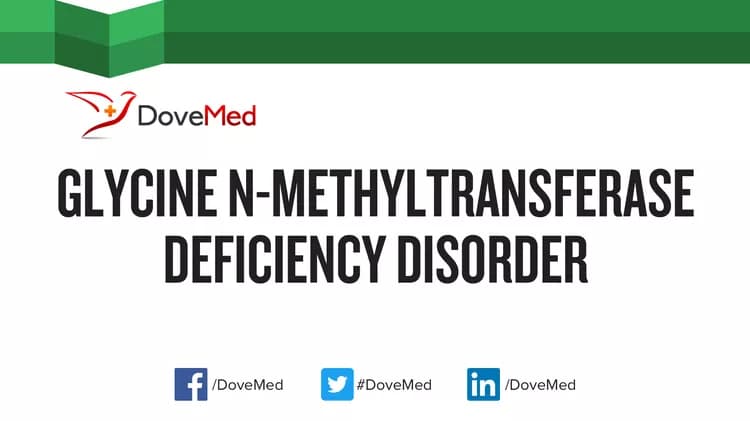What are the other Names for this Condition? (Also known as/Synonyms)
- GNMT Deficiency Disorder
- Hypermethioninemia due to Glycine N-Methyltransferase Deficiency
- Hypermethioninemia due to GNMT Deficiency
What is Glycine N-Methyltransferase Deficiency Disorder? (Definition/Background Information)
- Glycine N-Methyltransferase Deficiency (GNMT Deficiency) Disorder is a very rare condition characterized by persistent and isolated excess levels of methionine in blood (hypermethioninemia)
- The only clinical abnormalities are mild increase of the liver size (hepatomegaly) and chronic elevation of the transaminase levels in blood without liver disease. Methionine may also be increased in urine
- However, because elevated levels of methionine in blood itself is a risk factor for development of neurological signs and symptoms, people with Glycine N-Methyltransferase Deficiency Disorder can have neurological problems when methionine levels are greater than 800 μmol/L
- Glycine N-Methyltransferase Deficiency Disorder is caused by mutations in the GNMT gene. Inheritance is autosomal recessive
- Treatment is not needed in most cases
(Source: Glycine N-Methyltransferase Deficiency Disorder; Genetic and Rare Diseases Information Center (GARD) of National Center for Advancing Translational Sciences (NCATS), USA.)
Who gets Glycine N-Methyltransferase Deficiency Disorder? (Age and Sex Distribution)
- Glycine N-Methyltransferase Deficiency Disorder is a very rare congenital disorder. It has been so far described in 5 individuals belonging to 4 families
- The presentation of signs and symptoms may occur in childhood
- Both males and females may be affected
- Worldwide, individuals of all racial and ethnic groups may be affected
What are the Risk Factors for Glycine N-Methyltransferase Deficiency Disorder? (Predisposing Factors)
- A positive family history may be an important risk factor, since Glycine N-Methyltransferase Deficiency Disorder is an inherited condition
- Currently, no other risk factors have been clearly identified for this disorder
It is important to note that having a risk factor does not mean that one will get the condition. A risk factor increases one’s chances of getting a condition compared to an individual without the risk factors. Some risk factors are more important than others.
Also, not having a risk factor does not mean that an individual will not get the condition. It is always important to discuss the effect of risk factors with your healthcare provider.
What are the Causes of Glycine N-Methyltransferase Deficiency Disorder? (Etiology)
Glycine N-Methyltransferase Deficiency Disorder is a genetic condition that occurs due to mutation(s) involving the GNMT gene.
- This gene codes for the enzyme, glycine N-methyltransferase
- The causative GNMT gene mutations are inherited in an autosomal recessive manner
Autosomal recessive inheritance: Autosomal recessive conditions are traits or disorders that occur when two copies of an abnormal gene have been inherited on a non-sex chromosome. If both parents have an autosomal recessive condition, there is a 100% likelihood of passing on the mutated genes to their children. If, however, only one mutant copy of the gene is inherited, the individual will be a carrier of the condition, but will not be present with any symptoms. Children born to two carriers, have a 25% chance of being homozygous dominant (unaffected), a 50% chance of being heterozygous (carrier), and a 25% chance of being homozygous recessive (affected).
What are the Signs and Symptoms of Glycine N-Methyltransferase Deficiency Disorder?
The signs and symptoms of Glycine N-Methyltransferase Deficiency Disorder may include:
- Elevated hepatic transaminases
- Hepatomegaly
- Hypermethioninemia
(Source: Glycine N-Methyltransferase Deficiency Disorder; Orphanet, National Institute of Health and Medical Research (INSERM), Paris.)
How is Glycine N-Methyltransferase Deficiency Disorder Diagnosed?
Glycine N-Methyltransferase Deficiency Disorder is diagnosed on the basis of the following information:
- Complete physical examination
- Thorough medical history evaluation
- Assessment of signs and symptoms
- Laboratory tests
- Imaging studies
- Biopsy studies, if necessary
Many clinical conditions may have similar signs and symptoms. Your healthcare provider may perform additional tests to rule out other clinical conditions to arrive at a definitive diagnosis.
What are the possible Complications of Glycine N-Methyltransferase Deficiency Disorder?
The complications of Glycine N-Methyltransferase Deficiency Disorder may include:
- Embarrassment, if there is body odor (that is often similar to a boiled cabbage) due to elevated methionine levels in blood
- Potential risk for neurological symptoms, such as muscle weakness, difficulty with movement and sluggishness
Complications may occur with or without treatment, and in some cases, due to treatment also.
How is Glycine N-Methyltransferase Deficiency Disorder Treated?
- In most cases, Glycine N-Methyltransferase Deficiency Disorder is asymptomatic and does not require treatment
- In those individuals with levels of methionine greater than 800 μmol/L, restriction of methionine in the diet may be recommended
How can Glycine N-Methyltransferase Deficiency Disorder be Prevented?
Currently, Glycine N-Methyltransferase Deficiency Disorder may not be preventable, since it is a genetic disorder.
- Genetic testing of the expecting parents (and related family members) and prenatal diagnosis (molecular testing of the fetus during pregnancy) may help in understanding the risks better during pregnancy
- If there is a family history of the condition, then genetic counseling will help assess risks, before planning for a child
- Active research is currently being performed to explore the possibilities for treatment and prevention of inherited and acquired genetic disorders
Since the condition is asymptomatic in most cases, regular medical screening at periodic intervals with tests and physical examinations are recommended to evaluate any change over time.
What is the Prognosis of Glycine N-Methyltransferase Deficiency Disorder? (Outcomes/Resolutions)
- The prognosis of Glycine N-Methyltransferase Deficiency Disorder is good, as most affected individuals are asymptomatic and healthy
- However, routine monitoring of methionine levels and keeping it between 500-600 μmol/L by restricting amino acid in diet may be necessary to avoid neurological complications
Additional and Relevant Useful Information for Glycine N-Methyltransferase Deficiency Disorder:
The following DoveMed website link is a useful resource for additional information:
Related Articles
Test Your Knowledge
Asked by users
Related Centers
Related Specialties
Related Physicians
Related Procedures
Related Resources
Join DoveHubs
and connect with fellow professionals


0 Comments
Please log in to post a comment.